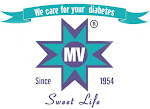Aadarsh & ROHINI (Dietitians)
BMVNES
During Ramadan people fast for a month during the day and feast at the break of dawn and at dusk. This can be a cause of serious dehydration due to no water consumption during peak sunny hours of the day and muscle loss due to lack of food intake. Mealtimes are not regular and the body may not get the nutrition it needs which can lead to health problems since the fasting continues for a month. Here are some ways in which the diet can be modified during this period of fasting.
Those who fast during Ramadan often end up overeating which can lead to weight gain, acidity and digestion problems. Experts say one must follow a proper diet plan, avoid fried food and red meat and exercise regularly.
People with
diabetes should be careful and avoid hypoglycemia (low sugar level in blood).They needto pay special attention to their condition all year around and especially in the month of Ramadan as they become vulnerable to several complications during fasting. They should follow doctors instructions as they face risks due to changes in eating patterns that might cause serious complications like hypoglycemia and hyperglycemia . It is recommended that they also check their glucose levels twice while fasting and once after breaking the fast.
Dietary recommendation during Ramadan:
- Eat food items like grains, barley, wheat, oats, millet, semolina, beans, lentils, bran, green peas, apricots, prunes and almonds.
- Avoid big meals and eat slowly.
- Drink juice to avoid digestive problems.
- Avoid deep fried food and red meat as it causes acidity and digestion problems.
- Have proper protein intake.
- Diabetic patients should be more careful and avoid hypoglycemia (low sugar level in blood).
Start the day with water followed by vegetable sandwiches or oats with veggies and nuts. In the evenings, break your fast with water again and eat dates and fruits as well. After the prayers, take rice, rotis, salad, vegetables, dhal or chicken.
It is important to eat a good amount of vegetables to provide enough nutrition to the body. If you have a sweet craving, satisfy it by including fruits in your meal as it will help digest the food better. Include fibre and protein-rich foods. Avoid eating fried, oily and heavy food items as they cannot be easily digested and can make your stomach bloated later.
• Start your day with:
oats/brown rice/roties made of wheat , ragi, jowar fruits, and nuts
Milk, curds, and buttermilk
• Break your fast with fruits and opt for the following:
• salad/ soup
chicken/ fish – steamed, boiled, grilled, roasted or paneer
green veggies or mix vegetables
• Drink plenty of water before you sleep to rehydrate yourself and rest well to rejuvenate your body for the next day’s fast.
It is safe to exercise during Ramadan. Exercise at the right time and at low to moderate intensity.
Exercises recommended:
1. Low intensity cardio exercise like walking or cycling. It helps in burning calories and improves stamina.
2. Low intensity resistance training. It helps to maintain your muscle strength.
3. Stretching exercise. Full body stretching.It helps to improve flexibility and also in detoxification.
4. Floor exercises like free squats, pushups, calf raises etc. It improves your functional activities.
5. Yoga and meditation. It helps in detoxification.
6. Low intensity group classes which helps to burn calories and with less difficulty as you are exercising with others.
7. Exercise for 20 to 40 minutes.
8. Don't exercise during the fasting phase. Exercise eitherbefore or after the meal. Exercising during fasting will burn muscles.9. Avoid high intensity exercises like high speed running, stepper, heavy weight lifting, high intense group classes as it can lead to joint or muscle injuries and complications like low blood pressure, hypoglycemia, dizziness, etc.
During Ramadan people with diabetes should manage their diet, physical exercise, glucose levels and watch out for any complications that might emerge





















